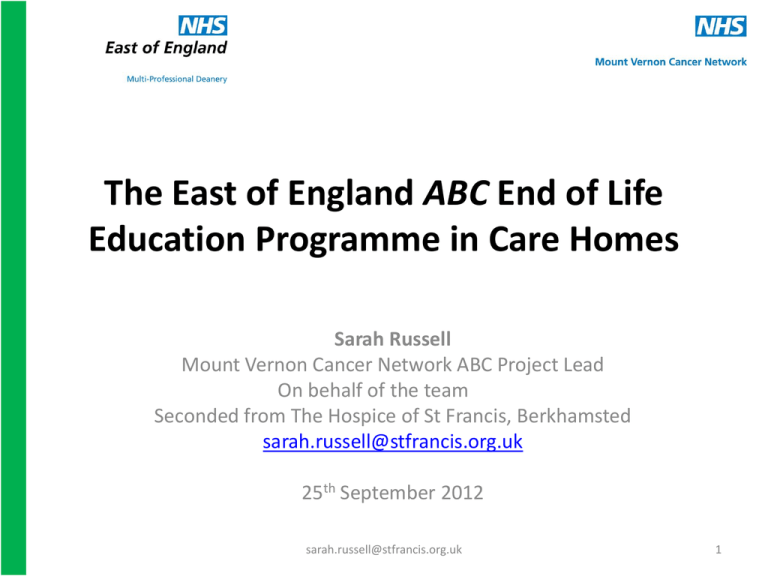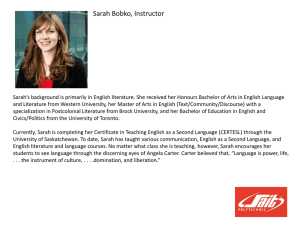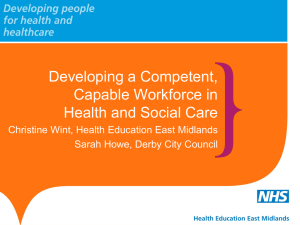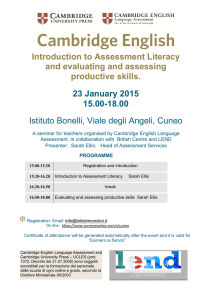The ABC End of Life Education Programme in Care Homes
advertisement

The East of England ABC End of Life Education Programme in Care Homes Sarah Russell Mount Vernon Cancer Network ABC Project Lead On behalf of the team Seconded from The Hospice of St Francis, Berkhamsted sarah.russell@stfrancis.org.uk 25th September 2012 sarah.russell@stfrancis.org.uk 1 The ABC End of Life Education Programme in Care Homes: • What is the programme? • How does it link into other education out there? sarah.russell@stfrancis.org.uk 2 sarah.russell@stfrancis.org.uk 3 What is it? 1. A 2 year, NHS East of England funded and specifically designed care home end of life education programme 2. Delivered and evaluated (using the same tools) across the whole of the East of England: 2011 -2012 • 3. Anglia, Essex, Beds, Herts and Luton Uses End of Life Facilitator Educators (EFE’s) providing a blended learning package in the care home setting 4 WTE in Hertfordshire 1 WTE Bedfordshire, 1 WTE Luton They are also simultaneously delivering a community and hospital end of life education programme sarah.russell@stfrancis.org.uk 4 The process 1. 6 core end of life modules plus follow up workshop Learners and Managers evaluation and action plan Identification of 3 care home champion roles End of Life,Learning, Quality Care home end of life standards 2. Pre and post Audit of care home resident notes Benchmark of end of life polices and procedures Learners confidence in end of life care 3. Managers and Learners evaluation of the programme 4. Analysis of hospital non elective admission data 5. Transferable national accreditation and certificates sarah.russell@stfrancis.org.uk 5 The Modules: 1. 2. 3. 4. 5. 6. 7. Overarching principles Assessment and care planning Comfort and well being Communication skills Advance care planning End of life tools Follow up workshop 8. Due this year: Caring in the last days.................... sarah.russell@stfrancis.org.uk 6 Title Diagnosing dying (weeks, days, hours) Patient choices Signs of dying Physical care Physical comfort Last offices Emotional care Involving the family Communication sarah.russell@stfrancis.org.uk 7 Overview of structure sarah.russell@stfrancis.org.uk 8 NHS East of England Care Home Education Programme in Mount Vernon Cancer Network sarah.russell@stfrancis.org.uk 9 In our area also includes: • • • • • Champion follow up workshops Care Home Standards Advance Care Plan Check List Ongoing support Linking into other education sarah.russell@stfrancis.org.uk 10 NHS East of England Care Home Education Programme in Mount Vernon Cancer Network ‘Has completely changed staff attitudes toward death, and end of life care. The importance of treating our residents as individuals and putting their needs and wishes in front of all others’ Care Home Manager ‘Preferred Priorities for Care document has acted as a catalyst for initiating and embracing conversations that no-one wants to start.’ Care Home Learner ‘Fabulous initiative and I know the homes have welcomed the input – Thank you’ ‘All care staff need to be equipped to deal with all of the situations in the programme. It was more than an education programme, it results in a change in thinking, attitude and priorities’ ‘Valuable course and I want all my staff to complete this in the future. I would definitely recommend care home staff to attend this programme’ sarah.russell@stfrancis.org.uk ‘End of life care has improved dramatically in the home. We now have more and more ‘good’ deaths’ ‘Following the E-learning we now realise how important care of the residents’ family is. We have cleared a room which relatives can receive support and privacy in. Feed back from relatives from this have been very positive.’ Care Home Learner 11 End of Life Scrutiny May 2012 Recommendations for Health & Community Services • Health & Community Services accreditation criteria of care and nursing homes recognises end of life training and provides financial assistance in partnership with health colleagues to enable continuation of the training programme • The training, whether based in a care home setting or through educators leading sessions for health centre staff, enables staff involved in end of life to develop the confidence to raise sensitive issues and initiate difficult conversations. sarah.russell@stfrancis.org.uk 12 1. The East of England End of Life Education Programme is proving to be effective 2. Member visits to care and residential homes highlighted to members the good practice in the county. 3. It is clear that end of life training increases staff confidence and the ability to support people to die in their preferred setting. 4. The result is fewer transfers (to hospital, hospice etc) and this included a care home for clients with profound dementia. 5. Members heard that not all care home had received end of life training, therefore there was inconsistent practice across the county. 6. The group would like all homes providing care on behalf of Hertfordshire County Council (HCC) to undertake both the end of life training and to adopt the strategy. 7. Accreditation should be a factor in selecting the provider. sarah.russell@stfrancis.org.uk 13 IPU: Keech Hospice Educ: Peace Hospice DN: HCHS CNS/Educ: Isabel Hospice Educ: Hospice of St Francis DN: Bedford Peace Hospice, Hospice of St Francis, NHS EOE sarah.russell@stfrancis.org.uk 14 How does it link into other education? End of Life and Cancer Education Steering Group West Herts Watford General Hospital Macmillan Team The Peace Hospice The Hospice of St Francis Iain Rennie Grove House Community Macmillan Nurses Community Nurses University East and North Herts Isabel Hospice Garden House Hospice Community Macmillan Nurses Hospital Macmillan Nurses Community Nurses University Beds and Luton Keech Hospice Community Palliative Care Team Hospital Palliative Care Team Community Nurses University sarah.russell@stfrancis.org.uk The Cancer Centre Oncology Team Palliative Care Team University 15 Mount Vernon Cancer Network End of Life Education Overview 2013 Syringe Driver sessions LCP sessions ½ day Comm Skills in Practice MVCN Palliative Care Competency Programme Introduction, Principles of palliative care, holistic and carers and key worker assessment Policies, spirituality, sexuality, psychological support, depression and anxiety ½ day ACP and DNACPR awareness Symptom control 1 day Pain and Symptom Control Palliative care emergencies 1 day non malignant end of life care day Pain assessment and management 1 day Holistic assessment & mgt End of Life strategy in practice including LCP, GSF, PPC. Communication skills in practice day 2 day MVCN ACST programme 1 day Intro to Comm and Significant news MVCN Psychology level 2 programme MVCN DNACPR Competency rogramme ABC e learning programme University programmes Oncology competency programme Advance care planning and DNACPR ½ day workshop 1 day Introduction to oncology Introduction to palliative care for HCA’s End of Life E learning East of England Care Home Programme http://www.endoflifecarelearning.co.uk/login/index.php eLCA http://www.e-lfh.org.uk/projects/e-elca/index.html Writing for publication MVCN CNS Transition programme Teaching and presenting sarah.russell@stfrancis.org.uk Local CPD sessions Own organisation sessions 16 Why do the ABC programme? 1. It makes a difference to care and to you 2. It increases individuals dying in their care home 3. It is accessible and flexible 4. It comes with a mentor – and they are stars! 5. It comes with an ongoing relationship 6. It provides a nationally recognised course sarah.russell@stfrancis.org.uk 17 After Coffee: Interactive session 1. Look at the programme 2. Look at the resources 3. Discuss and reflect together sarah.russell@stfrancis.org.uk 18 Care home champion experiences 1. What is the experience in Hertfordshire 2. Lessons learnt sarah.russell@stfrancis.org.uk 19 Mapping the programme to Skills for Care End of Life Qualifications sarah.russell@stfrancis.org.uk 20 End of Life qualifications Mapping template to units available List of qualifications Level 2 Award Awareness in End of Life Care Level 3 Award Awareness of End of Life Care Level 3 Certificate in Working in End of Life care Level 5 Certificate in Leading and Managing Services to Support End of Life and Significant Life Events List of core units within qualifications Key = mandatory RITS reference number EOL 201 Understand how to work in end of life care knowledge 2 3 A/503/8085 EOL 301 Understand how to provide support when working in end of life care knowledge 3 4 Y/503/8689 EOL 302 Managing symptoms in end of life care competence 3 3 Y/503/8644 EOL 303 Understand Advance Care Planning knowledge 3 3 A/503/8135 EOL 304 Support the spiritual well being of individuals competence 3 3 M/503/8133 sarah.russell@stfrancis.org.uk L5 Cert size L3 Cert Credit L3 Level competence Award Knowledge / L2 Unit title Award SFC Unit ref no = optional 21 End of Life qualifications mapping template EOL 201 Links with programme Learning outcome Assessment criteria Identified Module 1. Know different perspectives on death and dying 2. Understand the aims, principles and policies of end of life care Links Gaps Comments 1.1 Outline the factors that can affect an individual’s views on death and dying 1.2 Outline the factors that can affect own views on death and dying 1.3 Outline how the factors relating to views on death and dying can impact on practice 1.4 Define how attitudes of others may influence an individual’s choices around death and dying 2.1 Explain the aims and principles of end of life care 2.2 Explain why it is important to support an individual in a way that promotes their dignity 2.3 Describe the importance of maintaining comfort and well being in end of life care 2.4 Explain the stages of the local end of life care pathway sarah.russell@stfrancis.org.uk 22 Sustaining the programme through the Training the Trainer pilot sarah.russell@stfrancis.org.uk 23 End of Life Champion Purpose: to maintain the passion and focus on end of life care in your setting through the encouragement and support of your staff as well as working with the manager to ensure relevant policies, documentation and procedures are in place. Learning Champion Purpose: To facilitate new and current staff in end of life learning either though participation in the End of Life education programme delivered by yourself or by your educator mentor. Encourage and source opportunities of extra learning available locally. Quality Champion Purpose: To enable the accurate measuring and reporting of good end of life care through regular audit , surveys and systematic reporting. This enables you to be able to demonstrate for inspections (e.g. Care Quality Commission, Commissioners), residents and clients about the quality of the care you provide. It also enables you as a care home to be able to share good practice or learn different ways of doing things sarah.russell@stfrancis.org.uk 24 Sustaining the programme through the Training the Trainer pilot 18 homes • 6 in Herts • 6 in Essex • 6 in Anglia Oct 2012 – March 2013 Aim is to enable the learning champions to deliver the training in their own settings sarah.russell@stfrancis.org.uk 25 Formal Evaluation: University of Hertfordshire Independent evaluation from a credible academic and knowledgeable source 1. What evidence is there that TtT increases residents’ (and where appropriate family members) care home and NHS staff, engagement with advance care planning and ongoing conversations about end of life care? 2. What impact does the TtT have on care home staff’s confidence, reported knowledge, symptom assessment and management and involvement with NHS services when providing end of life care? 3. What are the costs? 4. What were the barriers and facilitators to the implementation of the programme? sarah.russell@stfrancis.org.uk 26 Mixed Method • • • • • Observation Questionnaires Audio Diaries Interviews plus 3 focus groups After death analysis and review of care and resources used sarah.russell@stfrancis.org.uk 27 sarah.russell@stfrancis.org.uk 28 ‘The Hert of Care End of Life in Care Homes in Hertfordshire’ Summary 25th September 2012 0915 Coffee and registration 0930 0940 Welcome, housekeeping, CQ, outline of the day, introductions Defining End of life care: Who, what, why when? Sarah Russell (ABC Project lead) 0950 Commissioning end of life care: Challenges and Opportunities: 1005 Dying in a multimedia world: How does society construct death and dying? Gordon Pownall (Commissioning Lead for End of Life and Palliative Care: Hertfordshire) Dr Ros Taylor (Clinical Trustee, Help the Hospices, Hospice Director: Hospice of St Francis, Berkhamsted, DL Hertfordshire) 1035 The ABC End of Life Education Programme in Care Homes: •What is the programme? •How does it link into other education out there? 1100 Coffee break 1115 1150 1215 Interactive session with education mentors and care home champions Care home champion experiences •What is the experience in Hertfordshire? •Lessons learnt Mapping the programme to Skills for Care End of Life Qualifications: 1230 Sustaining the programme through the Training the Trainer pilot Sarah Russell EFE’s Care home champion and education mentor Kathryn Chamberlain (Skills for Care Area Officer Eastern) and Sarah Russell Sarah Russell 1245 Closing thoughts and evaluation forms 1300 Close sarah.russell@stfrancis.org.uk 29 Closing Thoughts: 1. What do you know now which you did not know before? • Confidence questionnaire • Evaluation form 2. What are you going to do next? sarah.russell@stfrancis.org.uk 30 ‘The Hert of Care End of Life in Care Homes in Hertfordshire’ 25th September 2012 The journey to where? I don't know where life will take me. I don't know how the river bends or where the rapids may be. Radiotherapy completed my treatment, but my journey isn't finished. My cancer seems to be gone, but who can be sure? There are no certainties, and from time to time a new pain has panicked myself and my loved ones. My body may be healed now but adjusting to the changes in my life and the recovery of my emotions, my soul, and my spirit takes longer sarah.russell@stfrancis.org.uk 31






